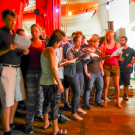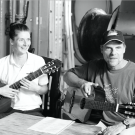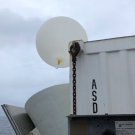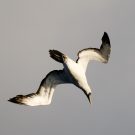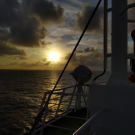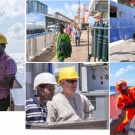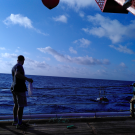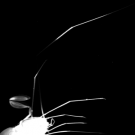Auf Reisen gibt es nichts Besseres, als die lokalen Gerichte zu probieren. Es geht oft um mehr als nur eine Mahlzeit, es geht auch darum eine Kultur zu erleben. An Bord der M159 gaben Mike und Rainer uns diese unglaubliche Erfahrung. Jeden Tag entdeckten wir Deutschland und andere Länder. Sie haben uns von Hamburg nach […]
101 Things to Eat in the Atlantic Ocean
When travelling, there is nothing better than tasting the local food. It is often more than just a meal, it is also about experiencing a culture. On board of the M159, Mike and Rainer gave us that incredible experience. Every single day, we discovered Germany and other countries. They have transported us from Hamburg to […]
Transitions & Connections
For 21 days, the Meteor has passed through the waters of the Atlantic Ocean. Starting our expedition M159 in the southern hemisphere in Recife, Brazil, we worked our way northward to a ship position close to the Cap Verde Islands, where we are about to collect our last mooring for this cruise – the Cape […]
Light and Shadows Aboard the R.V. Meteor
I like making photographs of mountains. Mostly because of the sheer beauty of them, but also because the process to do so is particularly simple and yet it generally makes for splendid pictures: first one has to climb another neighbouring mountain, then one has to point the camera in the general direction of the first […]
The Meteorological Station
The R/V Meteor has a meteorological station from the German Weather Service (Deutscher Wetterdienst, DWD) and a technician to operate it on board. In 1964, the previous Meteor was the first research vessel with a meteorological station operated by the DWD. When the ship was replaced by the current Meteor in 1986, a meteorological station […]
Wildlife at the High Sea in the Atlantic
What is the base of life in the open sea? This is a very complex question, because many factors and forces are at work in the high sea. But let’s start somewhere, maybe with the water itself… Upwelling regions are, in simple terms, a convergence of deep ocean currents bringing cold water, rich in nutrients, to the […]
Data Collection at Sea
As a computer scientist I am used to working with different types of data collected from various sources. Recently, I started my PhD in the MarData program that aims at bringing together – amongst others – computer science and oceanography. “That’s cool!”, I thought, “just another kind of data to do analyses on!”. But the […]
Diary of a First Time Ocean-Goer
HOW IT STARTED In my entire life, I have never been on the high sea; so to sleep and wake up the next day to nothing but the greeting of screeching of the ship and sounds of the rolling waves and the background music aboard is interesting. Yes, on several occasions I have been involved […]
My First Scientific Cruise: The Difficulty of Field Work
During my Bachelor program, me and my fellows learned a lot about the physics of ocean properties, circulation and much more. Apart from the complex formulas, the most interesting parts were the plots, which showed the properties of ocean waters and their dynamics all around the world. In simple terms, we used big datasets and […]
The Life We Cannot See
Ocean is not only home to wildlife that we can observe with our own eyes, such as big mammals, fishes and seaweed. There are also small living organisms, which we do not always know about, because we do not see them with our naked eyes. In Ocean Science, to see beneath the ocean surface, the […]
